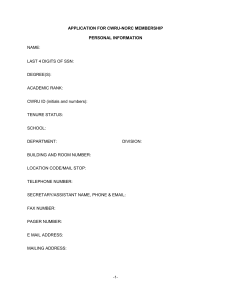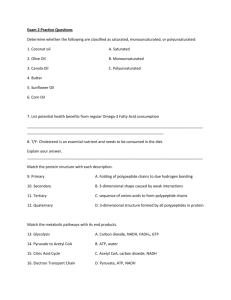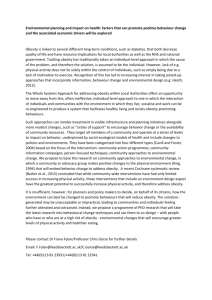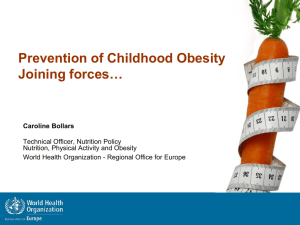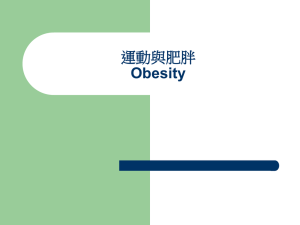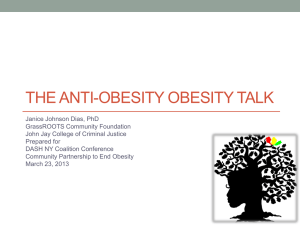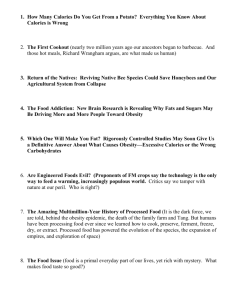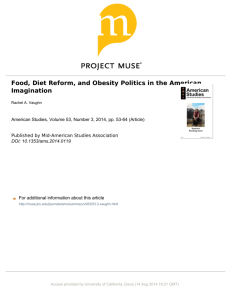File - Patricia Boling, Associate Professor of Political
advertisement
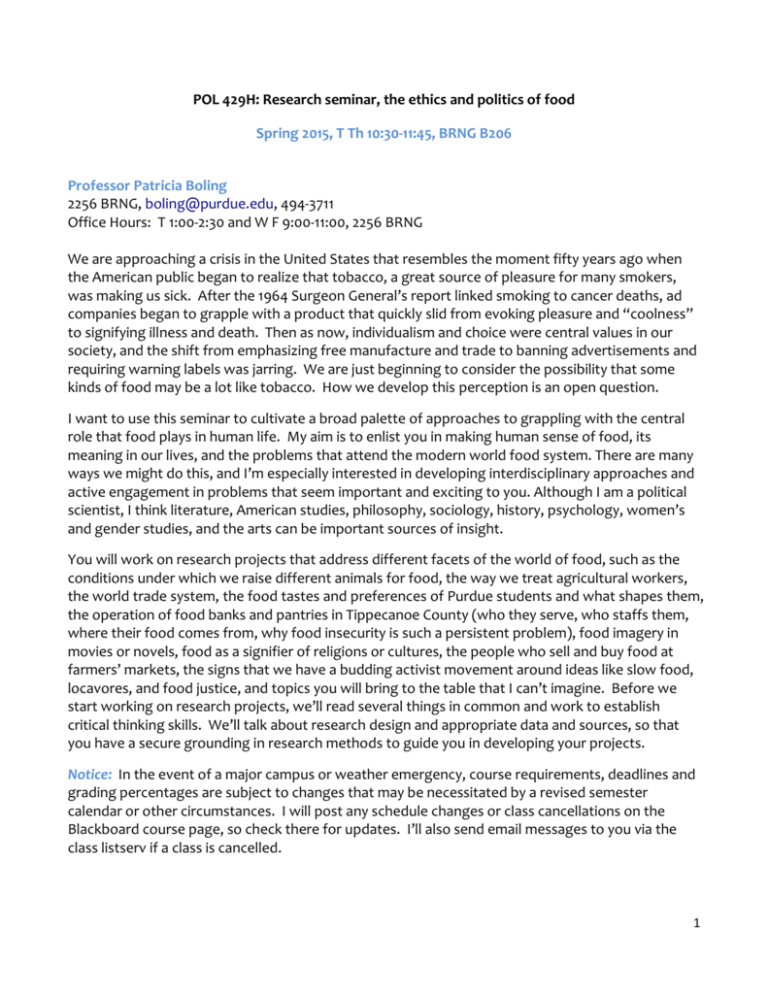
POL 429H: Research seminar, the ethics and politics of food Spring 2015, T Th 10:30-11:45, BRNG B206 Professor Patricia Boling 2256 BRNG, boling@purdue.edu, 494-3711 Office Hours: T 1:00-2:30 and W F 9:00-11:00, 2256 BRNG We are approaching a crisis in the United States that resembles the moment fifty years ago when the American public began to realize that tobacco, a great source of pleasure for many smokers, was making us sick. After the 1964 Surgeon General’s report linked smoking to cancer deaths, ad companies began to grapple with a product that quickly slid from evoking pleasure and “coolness” to signifying illness and death. Then as now, individualism and choice were central values in our society, and the shift from emphasizing free manufacture and trade to banning advertisements and requiring warning labels was jarring. We are just beginning to consider the possibility that some kinds of food may be a lot like tobacco. How we develop this perception is an open question. I want to use this seminar to cultivate a broad palette of approaches to grappling with the central role that food plays in human life. My aim is to enlist you in making human sense of food, its meaning in our lives, and the problems that attend the modern world food system. There are many ways we might do this, and I’m especially interested in developing interdisciplinary approaches and active engagement in problems that seem important and exciting to you. Although I am a political scientist, I think literature, American studies, philosophy, sociology, history, psychology, women’s and gender studies, and the arts can be important sources of insight. You will work on research projects that address different facets of the world of food, such as the conditions under which we raise different animals for food, the way we treat agricultural workers, the world trade system, the food tastes and preferences of Purdue students and what shapes them, the operation of food banks and pantries in Tippecanoe County (who they serve, who staffs them, where their food comes from, why food insecurity is such a persistent problem), food imagery in movies or novels, food as a signifier of religions or cultures, the people who sell and buy food at farmers’ markets, the signs that we have a budding activist movement around ideas like slow food, locavores, and food justice, and topics you will bring to the table that I can’t imagine. Before we start working on research projects, we’ll read several things in common and work to establish critical thinking skills. We’ll talk about research design and appropriate data and sources, so that you have a secure grounding in research methods to guide you in developing your projects. Notice: In the event of a major campus or weather emergency, course requirements, deadlines and grading percentages are subject to changes that may be necessitated by a revised semester calendar or other circumstances. I will post any schedule changes or class cancellations on the Blackboard course page, so check there for updates. I’ll also send email messages to you via the class listserv if a class is cancelled. 1 Most of the readings assigned for this course can be found on the course blackboard page; I will ask you to read one book each on your own and to write a review of it, and I explain the book review assignment in detail below. Course Requirements (detailed explanations follow): 20% 10% 10% 20% 10% 5% 25% 100% Class participation (attendance, being prepared, participating in & generating discussion) occasional questions and journaling, TBA response papers to assigned readings (please turn in 10 in all) book review (due March 3) research proposal with short bibliography (individual or group, either is OK, due March 12) class presentation of research project (last three class meetings, be there for all of these please) Research project (please hand in a rough draft April 16; final projects/papers due May 6) Class participation. This is a research seminar, and a lot of the learning goes on through class discussion. You are expected to be careful critical readers who develop your own “take” on the articles, chapters and essays we read and movies/uTube videos we watch in class. Keep all your notes and responses to such readings and viewings in one place; look at them again from time to time. Gauge how you are changing as a reader or evaluator. The first 3 parts of the course requirements work together; my aim is to give you exercises that help you become thoughtful, perceptive readers and thinkers, to encourage you to read critically, and to make sure you’re prepared for class. So on the first class meeting, I’ll hand out some prompts for you to respond to for the second class meeting, and I’ll assign this kind of impromptu writing (“occasional questions and journaling”) from time to time. In addition, please use the reading journal template provided on Blackboard to evaluate 10 readings that we read in the first seven weeks of the semester, and hand them in at the end of the class for which the reading was assigned. Book review. Read and write a 1000 word or shorter review of a popular book on food or agriculture related issues. A good example would be one of the books reviewed by Ferrier in the article we read February 10, but there are lots more that would work—the idea is to read a mass distribution book which is aimed at a popular audience, perhaps with the aim of arousing indignation or build a social movement - see your bibliography below for lots of ideas, good candidates are bolded. Your review should take note of the author’s perspective, biases, important questions raised or arguments made, who it appeals to, who is likely to be put off, etc. Also be sure to read Pearce’s article, "Brave New Jungle,” which is assigned for February 17 before you write this review, as Pearce will help you think about target audiences and arguments meant to inspire activism. Research project—detailed description: The big assignment in this course is to decide on an important topic, research it, write a paper about it, and present your project to the class. These projects should deal with particular aspects of food politics or ethics. I strongly recommend that you meet and speak with me, either individually or in groups, about possible topics, research design, and sources before you develop a research proposal, which is due on March 3. You can do this project by yourself or in a group; if you decide to form a group, you’ll need to meet together, talk about possible topics, and do some preliminary research so that you can decide on a decent proposal by 3/3, and you’ll need to be organized and cooperative enough to find time to work together on this outside of class. I expect group projects to take on bigger and more 2 challenging topics than individual ones, such that the effort expended on these is similar on a per capita basis. You should decide on a topic that’s interesting, novel, and important. You might want to focus on some local aspect of food policy, especially since we live in an agriculture-focused area. I suggest some topics below, but don’t feel constrained to choose one of these; draw on your own imaginations and sense of what’s important about industrial food production, global food justice, alternative approaches to food, the construction of fat and fit bodies, the obesity epidemic, etc. The end product of this project will be a short paper and well-structured presentation. Both should have a clear focus and argument, and the paper should be well-written and draw on several intelligent, academically credible sources. The projects will be presented to the class during the last 2 weeks of the semester, with approximately six students presenting their projects during each of our last three class meetings (I anticipate some individuals and some groups will present at each class meeting). Rough drafts are due on April 16th, and final papers are due May 6th. Budget your time and do good work. Possible topics: 1. Examine local farm and/or animal husbandry practices: you might investigate CAFO’s in our area, e.g., commercial dairy, poultry or swine operations, or draw on the research or Extension Education about CAFO’s conducted at or offered through the Purdue College of Agriculture (see websites below; Purdue runs a swine facility in WL). You could also investigate alternative forms of farming in this area: organic farming, sustainable farms, small-scale egg and meat production, etc. 2. Examine the politics of the agriculture bill and food nutrition programs like SNAP (Food Stamps), WIC, and subsidized school lunches: these are federal programs with state components, and they sometimes involve agricultural subsidies. How are programs to address food insecurity (hunger and nutrition issues) linked to support for big agriculture? Are there alternative visions of how to support farmers, and how to support people who struggle to put good food on the table? What kinds of debates have been generated about this in Congress? Might the CSPAN archives be a useful source for investigating differing positions and arguments? 3. Look at the rhetoric surrounding the “obesity epidemic”: is obesity a disease, as the word “epidemic” suggests? What’s loaded into this way of talking/thinking? What are the cultural forces that push Americans to worry about how much they weigh and what they look like? How do images and advertising shape both our notions of what is tasty and what ideal bodies should look like? Are these in conflict? Is the ultimate “winner” the weight-loss industry? 4. Examine food insecurity, at home or abroad: why are there people going hungry, and who are they? How do they cope? How has the recession affected the poor, the near-poor, and unemployed people with respect to food, nutrition, and hunger? What policies exist to help people feed themselves and their families? What institutions exist in this community to assist those who are hungry? Who is served by them? How well do they work? (this might entail visiting and interviewing people at local food pantries, discussing subsidized school lunch programs with local school administrators, observing students’ choices about what to eat, etc.) 5. Analyze arguments for and against taxing soft drinks or not permitting people to use SNAP to pay for sweetened soft drinks. Present arguments for and against policies that aim to limit how much soda people consume, and examine the public record to see who is on record for and against such policies and what their arguments have been, taking notice of special interests. Come up with a policy recommendation and defend it. 3 6. Consider the role of the advertising industry, along with food processors, farmers and growers, in encouraging us to consume particular kinds of food. What kinds of images and rhetoric are used in ads? How do ads reflect notions of gender, class, race, etc.? To what sorts of needs and desires do ads cater? How can the powerful rhetoric of advertising be deconstructed and combated to make Americans healthier and more critical consumers? Grades are based on scores on all your assignments, which are weighted in accordance with the course requirements listed above: Letter grade: Percentage cutoff: A+ 97% + A 93 A90 B+ 87 B 83 B80 C+ 77 C 73 C70 D+ 67 D 63 D60 F below 60 Course Schedule (note that this schedule is subject to change): Date Topic and reading/media 13-Jan 15-Jan intro to course, one another; on critical reading and thinking Nat'l Geo May 2014: "Eat: the new food revolution"; questions from first day 20-Jan 22-Jan Vileisis, Kitchen Literacy, pp. 3-29; Rozin, "The Meaning of Food in Our Lives" 2005 Billard & Blair, "The Revolution in American Agriculture," Nat'l Geo, Feb. 1970, 147-185. 27-Jan 29-Jan Berry, The Unsettling of America, pp. 59-73 3-Feb 5-Feb Tweeten, "The economics of global food security." Patel, Stuffed and Starved, ch. 4; Pechlaner & Otero, “The Neoliberal Food Regime: Neoregulation and the New Division of Labor in North America.” 10-Feb 12-Feb Ferrier, "Food in popular literature" (review of 3 books) PEW Trusts, "Putting Meat on the Table: Industrial Farm Animal Production in America" Davies, "An historical perspective from the Green Revolution to the gene revolution." Nutrition reviews 61.s6 (2003): S124-S134. 4 17-Feb Pearce, "Brave New Jungle: Factory Farming and Advocacy in the Twenty-First Century." 19-Feb Boling, "Moral, ethical and just: rediscovering how to make public claims about food" 24-Feb 26-Feb Food Chains (movie, shown in class on T and Th Feb 24-26) Food Chains (finish) 3-Mar What's the problem with respect to food today? Identifying some core questions. Also note that reviews of muckraking book, novel, or movie are due today. What's the problem? Forming research teams, deciding on problems, themes and approaches 5-Mar 10-Mar 12-Mar Obesity epidemic: Cohen, "Fat Britain"; Popkin et al, “Global nutrition transition and the pandemic of obesity in developing countries.” same: Ogden et al., “Prevalence of Obesity in the United States, 2011–2012.” Moss, "How the processed-food industry creates and keeps selling the crave" 17-Mar 19-Mar SPRING BREAK SPRING BREAK 24-Mar Advertising to children: Schor and Ford, “From Tastes Great to Cool: Children’s Food Marketing and the Rise of the Symbolic.” same: Harris et al., "A crisis in the marketplace: how food marketing contributes to childhood obesity and what can be done." 26-Mar 31-Mar 2-Apr Paul Campos, Julie Guthman: Is being fat really a problem? Whose problem is it? same, no new reading 7-Apr 9-Apr Food and the environment: UNEP, "A Review of the Earth's Carrying Capacity" same, no new reading 14-Apr 16-Apr Politics and policy making: Nestle, Food Politics, chapters TBA same: making policies and regulations at the local, state, federal and international levels (no new reading). Rough drafts of research projects due today. 21-Apr 23-Apr Other narratives: pop and high culture, literature, movies, music as they address fat bodies, food insecurity, etc. student presentations, averaging 6 students each day 28-Apr 30-Apr same same May 4-9 final exam week: final research projects due Wednesday May 6 at 5:00 pm 5 Talks and films (we’ll watch a few of these in class; you can check out the others on your own): 1. Mark Bittman on what's wrong with what we eat (filmed Dec 2007, 20 min), at http://www.ted.com/talks/lang/eng/mark_bittman_on_what_s_wrong_with_what_we_eat.html 2. Ann Cooper talks about school lunches (filmed December 2007, 20 min), at http://www.ted.com/talks/ann_cooper_talks_school_lunches.html 3. "Food, Inc." (91 minutes, available at Undergrad and BCC libraries) 4. Nash, Joy. "A Fat Rant." 2007. (7 minute 46 second you tube video, posted March 17, 2007) Accessed on August 23, 2010 at http://www.youtube.com/watch?v=yUTJQIBI1oA 5. theshadowed1. 2007. “re: A Fant Rant.” (5 minute 26 second you tube video, posted on March 26, 2007) Accessed on November 1, 2010 at http://www.youtube.com/watch?v=iU8QgNkv1A&feature=related 6. Campos, Paul. 2010. "Fat Identity and Politics" (Speech given on January 26, 2010 at UCLA’s Center for the Study of Women; 45 minute you tube video, posted January 26, 2010). Accessed on August 23, 2010 at http://www.youtube.com/watch?v=x-GgXY0oLjI 7. “King Corn”—this appealing film covers a year of growing corn in Iowa, and depicts some of Michael Pollan’s key arguments in a visually approachable way (on reserve at HICKS, watch at your leisure) 8. Several TED talks (beyond ##1 & 2 above): http://www.ted.com/playlists/75/what_s_wrong_with_what_we_eat.html Bibliography (with citations for works to be read in common, and many ideas for things to read) Alkon, Alison Hope and Julian Agyeman, eds. (2011). Cultivating Food Justice: Race, Class and Sustainability. Cambridge, MA: MIT Press. Berry, Wendell (1977). THE UNSETTLING OF AMERICA: CULTURE & AGRICULTURE, pp. 59–73 (critique of Billard & Blair) Billard, Jules B. and James Blair, “The Revolution in American Agriculture,” NAT. GEOGRAPHIC, Feb. 1970, 147-185. Boling, Patricia (forthcoming). “Moral, ethical and just: rediscovering how to make public claims about food.” (Chapter in edited book on food ethics, edited by Mary Rawlinson, forthcoming from Cambridge Scholars Press.) Bordo, Susan. 2003. Unbearable Weight: Feminism, Western Culture, and the Body, 10th anniversary edition, Berkeley: University of California Press Brown and Getz (2011). “Farmworker Food Insecurity and the Production of Hunger in California.” Chapter six of Alison Hope Alkon and Julian Agyeman, eds., Cultivating Food Justice: Race, Class and Sustainability. Cambridge, MA: MIT Press. Campos, Paul. 2004. The Obesity Myth: Why America's Obsession with Weight is Hazardous to Your Health. Gotham. 6 Compassion in World Farming (2012). “The Life of Laying Hens.” Accessed on August 11, 2014 at http://www.ciwf.org.uk/media/5235024/The-life-of-laying-hens.pdf. Dauvergne, Peter, The Shadows of Consumption: Consequences for the Global Environment, 2008, MIT Press Davies, W. Paul. "An historical perspective from the Green Revolution to the gene revolution." Nutrition reviews 61.s6 (2003): S124-S134. Eberstadt, Mary. "Is Food the New Sex?." Policy Review 153 (2009): 25-40. Parrish lib of mgt & econ Federal Trade Commission (2012). “A Review of Food Marketing to Children and Adolescents: Follow Up Report.” Ferrier, Peyton (2014). "Food in popular literature." Choices 29(1): 1-6 Foer, Jonathan Safran, Eating Animals, New York: Little, Brown and Company, 2009 [ethical argument against eating animals] Food Chains (2014). Food Chains [movie], website accessed on November 30, 2014 at http://www.foodchainsfilm.com/#the-solution Food, Inc (2008). Food, Inc. [movie] Gottlieb, Robert and Anupama Joshi (2010). Food Justice: Food, Health, and the Environment. MIT Press. Guptill, Amy E., Denise A. Copelton, and Betsy Lucal (2013). Food & Society: Principles and Paradoxes. Polity Press. Guthman, Julie (2011). Weighing In: Obesity, Food Justice, and the Limits of Capitalism. University of California Press. Hallett, Steve and John Wright (2011). Life Without Oil: Why We Must Shift to a New Energy Future. Prometheus Books. Harris, Jennifer L., Jennifer L. Pomeranz, Tim Lobstein, and Kelly D. Brownell (2009). "A crisis in the marketplace: how food marketing contributes to childhood obesity and what can be done." Annual review of public health 30 (2009): 211-225. Kahneman, Daniel. Thinking, fast and slow. Macmillan, 2011. Kluger, Jeffrey (2007). “The Science of Appetite.” Time, May 30, 2007. 7 Kotakorpi, Kaisa. "The incidence of sin taxes." Economics Letters 98.1 (2008): 95-99. LeGreco, Marianne (2011). “’Mama thinks I’m feeding you’: Using food rules to restructure school meal programs.” Chapter 9 of Cramer, Janet Muriel, Carlnita P. Greene, and Lynn Marie Walters, eds. Food as communication, communication as food. New York: Peter Lang. Lusk, Jason (2013). Food Police. New York: Crown Forum. Marshall, Thomas (2014). “Smoking, Public Policy, and Public Opinion: What's the Connection?” Paper presented at the 2014 annual meeting of the Western Political Science Association, April 2014, Seattle WA McClintock, Nathan (2011). “From Industrial Garden to Food Desert: Demarcated Devaluation in the Flatlands of Oakland, California.” Chapter five of Alison Hope Alkon and Julian Agyeman, eds., Cultivating Food Justice: Race, Class and Sustainability. Cambridge, MA: MIT Press. McWilliams, James E. (2009). Just Food. New York: Back Bay Books Mello, Michelle M., David M. Studdert, and Troyen A. Brennan (2006). "Obesity—the new frontier of public health law." New England Journal of Medicine 354(24): 2601-2610. Moss, Michael (2013). “How the processed-food industry creates and keeps selling the crave.” New York Times Magazine, February 24, 2013. _____ (2014). Salt Sugar Fat: How the Food Giants Hooked Us. New York: Random House. Nestle, Marion (2007). Food Politics: How the Food Industry Influences Nutrition and Health. Berkeley: University of California Press. _____ (2013). Eat Drink Vote: An Illustrated Guide to Food Politics. Rodale Press. Ogden, Cynthia L., Margaret D. Carroll, Brian K. Kit, and Katherine M. Flegal. (2012). “Prevalence of Obesity in the United States, 2009–2010.” NCHS Data Brief No. 82 January 2012 Paarlberg, Robert, Food Politics: What Everyone Needs to Know, New York: Oxford University Press, 2010 [global perspective on food scarcity] Patel, Raj (2007). Stuffed & Starved: The Hidden Battle for the World Food System. New York: Melville, Pearce, James I. "Brave New Jungle: Factory Farming and Advocacy in the Twenty-First Century." Duke Envtl. L. & Pol'y F. 21 (2010): 433. 8 Pechlaner, Gabriela and Gerardo Otero (2010). “The Neoliberal Food Regime: Neoregulation and the New Division of Labor in North America.” Rural Sociology 75(2): 179-208 Pew Charitable Trusts and Johns Hopkins Bloomberg School of Public Health (2007). Putting Meat on the Table: Industrial Farm Animal Production in America. A Report of the Pew Commission on Industrial Farm Animal Production. Accessed January 11, 2015 at http://www.ncifap.org/_images/PCIFAPFin.pdf Pollan, Michael, The botany of desire: a plant's eye view of the world, New York: Random House, 2001 _____ (2014). Cooked: A Natural History of Transformation. NY: Penguin. _____ (2009). Food Rules: An Eater’s Manual Guide to What to Eat. NY: Penguin. _____ (2009). In Defense of Food: An Eater’s Manifesto. NY: Penguin. _____ (2007). The Omnivore's Dilemma: A Natural History of Four Meals. NY: Penguin. Popkin, Barry M, Linda S Adair, and Shu Wen Ng (2012). “Global nutrition transition and the pandemic of obesity in developing countries.” Nutrition Reviews® Vol. 70(1):3–21 Rawal, Sanjay (2014). Director, Food Chains: Feeding the Nation at any Cost. [movie] Rozin, Paul (2005). "The meaning of food in our lives: a cross-cultural perspective on eating and well-being." Journal of nutrition education and behavior 37: S107-S112. Rozin, Paul, Abigail K. Remick, and Claude Fischler (2011). "Broad themes of difference between French and Americans in attitudes to food and other life domains: personal versus communal values, quantity versus quality, and comforts versus joys." Frontiers in psychology 2: 177. Schlosser, Eric (2001). Fast Food Nation: The Dark Side of the All-American Meal (Mariner Books) Schor, Juliet B. and Margaret Ford. “From Tastes Great to Cool: Children’s Food Marketing and the Rise of the Symbolic.” The Journal of Law, Medicine & Ethics 35.1 (2007): 10-21. Sinclair, Upton (1906). The Jungle. New York: Doubleday. Singer, Peter and Jim Mason, The Ethics of What We Eat: Why Our Food Choices Matter, Rodale, 2006 Slack, Tim (2014). “How Did the Great Recession Impact the Geography of Food Stamp Receipt?” Choices: The magazine of food, farm, and resource issues 29(2): 1-5 Striffler, Steve, Chicken, Yale University Press, 2005 HSSE: 338.176500973 St85c 2005 Sunstein, Cass R. "Preferences and politics." Philosophy & Public Affairs (1991): 3-34. 9 Thompson, Gabriel. 2010. Working in the Shadows: a year of doing jobs (most) Americans won’t do. Tweeten, Luther. "The economics of global food security." Review of Agricultural Economics 21.2 (1999): 473-488. UNEP (UN Global Environmental Alert Service), May 2012. “One Planet, How Many People? A Review of Earth’s Carrying Capacity.” Accessed January 12, 2015 at www.unep.org/geas Vileisis, Anne (2008). Kitchen Literacy. Washington, D.C.: Island Press Viscusi, W. Kip. Cigarette taxation and the social consequences of smoking. No. w4891. National Bureau of Economic Research, 1994. Websites of interest (you’ll find plenty more if you look): http://www.polyfacefarms.com/ (Polyface farms in the Shenandoah Valley, discussed by Pollan in Omnivore’s Dilemma) http://www.ansc.purdue.edu/CAFO/social_economic.shtml (Purdue Agricultural Extension site dealing with CAFOs) http://www.extension.purdue.edu/pork/ (this is Purdue’s “Pork at Purdue” gateway website) pollan_farmer_in_chief_nyt2008.docx - Oct 9, 2008 NYT Magazine article by Michael Pollan, “Farmer in Chief” on the food agenda Obama should adopt. Barco, Jacqueline, “Talking about how ‘fat’ you are is contagious,” 8-14-12 blog post http://www.rolereboot.org. busiansky_mathlessonsforlocavores_nyt.docx - Aug 20, 2010 NYT piece, Math Lessons for Locavores Lars Noah, “Room for Debate: Should Legislation Protect the Obese?,” Nov 28, 2011 NYT article ACADEMIC DISHONESTY: any form of plagiarism, presenting someone else’s work as you own, copying from other students’ work, or failure to cite references to books or other sources, is considered academic dishonesty. Those who are found to cheat in such ways will receive a zero for the assignment involved, and be reported to the Dean of Students’ office. If you’re in doubt about what constitutes plagiarism or other forms of cheating, ask. 10
